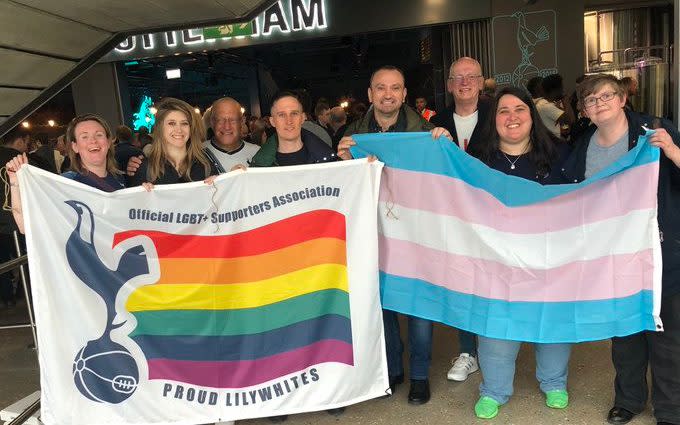'A lot of people in the community can feel like football is not for them, the Proud Lilywhites is trying to change that'


I first went to White Hart Lane in 1980 when I was six and I knew instantly that I loved Tottenham. I remember walking up the stairs, seeing the turf for the first time and a feeling of collective hope. That experience should not be denied to anybody.
A lot of people in the LGBTQ+ community can feel like football is not for them. I came out in my late teens – around the same time as my political awakening. I fell out of love with football a little because I felt I couldn’t reconcile the machismo associated with football fandom with my emerging feminism and sexuality.
In 2013, after an early rainbow laces campaign, a couple of LGBTQ+ supporters’ clubs cropped up throughout the country. Spurs wanted to engage their LGBTQ+ fans and met eight of us in a room on a wet night in 2014. The club said: ‘This is for you – tell us what you want.’ The Proud Lilywhites were born.
This is not us wanting special attention – which is, of course, one of the bricks that has been thrown at us. This is us saying: ‘We’re Spurs fans – just like you.’ There’s anecdotal evidence of people coming back to football because we exist. We have some trans members who loved Spurs in what you might call a former life and have come back. Our Co Chair Simon is a lifelong Spurs fan, but hadn’t gone to Spurs as an adult until the Proud Lilywhites and the Club helped him realise that football could be for him, as a gay man.
I follow the women’s team having met my late wife Monica, a former Spurs Ladies player, there in the 2000s. I’m hoping that this North London derby will be different to the men’s game: women’s football is all the fun of the men’s game without the machismo. The passion still exists in the women’s game, but it is all about fun, silliness and jokes, none of it about any protected characteristics. The historic rivalry between the two sets of fans will of course still exist, but I expect a different vibe.
Terrific 3 points for @SpursWomen today. Exemplary performances from the whole team and special mention to @AshNev10 and @Furney1988 who both bossed it. @hillsyk5 here we go! (And we want a pic with you next week!) #COYS#THWFCpic.twitter.com/AmeBcqZDwm
— Proud Lilywhites (@SpursLGBT) September 15, 2019
When we played Manchester United at the Hive, their fans were in the block next to us and we sang songs back and forth to each other. We have song sheets with Spurs Women chants and players love them. They might not know songs from the 80s (on which some of them are based), but these are young women, forging new careers; semi-professionals who have built their lives to have their first professional contracts. For them to have fans singing about them is a great, inclusive moment for everyone.


